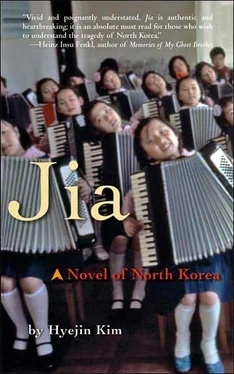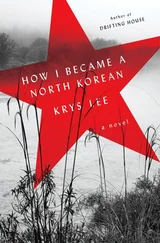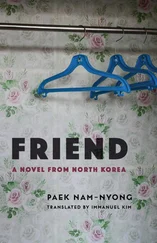My hope is that readers will gain a better understanding of the lives of North Koreans—beyond the lens of geopolitics or ideology—and see what I have seen in one woman’s eyes.
Hyejin Kim Singapore, March 2007
1905:Jia’s grandfather is born
1910, Aug. 29:Japan annexes Korea as a colony
1931:Manchurian Incident: Japan sets up a puppet government in northeastern China
1937:Outbreak of Sino-Japanese War
1940:Jia’s father is born
1943:Jia’s mother is born
1945, Aug. 15:Korean liberation from Japan with the end of World War II
1948, Aug. 15:Establishment of the Republic of Korea (South Korea)
1948, Sep. 9:Establishment of the Democratic People’s Republic of Korea (North Korea)
1949, Oct. 1:Establishment of the People’s Republic of China, led by Mao Zedong
1950, Jun. 25:Korean War begins
1953, Jul. 27:Korean War Armistice Agreement, after American and South Korean forces fight Chinese and North Korean forces to a stalemate
1966:Jia’s sister is born
1971:Jia is born
1976, Sept. 9:Death of Mao Zedong
1989:World Festival of Youth and Students in Pyongyang
1994, Jul. 8:Death of Kim Il Sung
1995–1999:Floods in 1995 and 1996 contribute to a famine that kills between 200,000 and 3.5 million and displaces tens or hundreds of thousands to China, Mongolia, Russia, Vietnam, and Thailand
1997, Oct. 8:Kim Jong Il officially assumes the titles General Secretary of the Workers’ Party of Korea and Chairman of the National Defense Commission
2004:460 North Koreans arrive in South Korea, after having traveled the length of China to Vietnam, where they were discovered
2006, Aug. 22:In a Bangkok suburb Thai police discover 175 North Koreans hoping for asylum
Idon’t know when I was born. I don’t know whether my mom ever saw my face or just left for the other world without a glimpse of me. I still wonder whether my father is alive or dead. After giving birth to me, my mother didn’t get enough to eat—no bowls of miyeokguk, no honey, eggs, or pork—not even the most basic food for a woman just out of childbirth. Instead, my grandmother soaked the placenta and umbilical cord in water, drained them of blood (they shrink and turn white), cut them into tiny cubes, and coated them with sugar so that my mom could swallow each piece in one bite. She wasn’t supposed to chew, in order to protect her teeth, which were still soft from the punishment of pregnancy, but she was too weak to swallow. In the end, this sustenance didn’t help enough; perhaps she didn’t want to share this world with me.
My grandmother liked to say I was a troublemaker even in the womb. It seemed I wanted out as soon as possible. My mom often rolled on the floor, clutching her stomach after a flurry of my kicks; they were sure I would be a boy, that I had been a soccer player in my previous life.
My grandmother’s face would bloom with a smile when she said, “Jia, you don’t know how happy we were when we saw you for the first time. We were so relieved that you were an adorable girl, and not the tough little nut of a boy we were expecting. Your sister and I couldn’t handle that, and now I don’t have to worry about you going crazy about soccer and coming home injured, like your father did when he was a boy.”
My father’s and mother’s photographs were hidden in a recess of my grandmother’s closet. My grandfather didn’t allow me to see them, and when he discovered me holding my parents’ pictures in my hands, he scolded me bitterly. He also shouted at my grandmother; he didn’t know she had held on to them, and that whenever I wasn’t feeling well she dandled me on her knee and showed me the photos for comfort. She would talk for hours about my father and mother, their love for each other, and my mother’s extraordinary beauty.
In his individual photos, my father never smiled. His thick hair was brushed straight back from his forehead; his eyes were two long slits, staring directly into the camera, as if in challenge. He looked stubborn, with his triangular face and thin lips. In the photos with my mother, however, he was transformed: his eyes turned to half-moons as he smiled; he looked like a bashful boy.
When my father saw my mother for the first time, dancing in her traditional hanbok with the grace of a pink-winged butterfly, he fell in love instantly. When I saw the pictures, I envied her big eyes, straight legs, and thin waist. She put on such bright makeup and wore beautiful dresses, and always smiled in her pictures. I wondered if she still smiled in the other world.
My sister also remembered our mother. When my body was feverish, she would hold my hand in bed and talk about her.
“At first, I despised you. I believed you took Mom to the other world. I didn’t want to see you or take care of you at all. You would cry for days at a time—you were always hungry, because we couldn’t feed you well. I even prayed you would go back to your world and Mom would return in your place. But Jia, you’re my treasure now. I can’t stand it when you’re sick—don’t be sick anymore.” We fell asleep hugging each other tightly. Her hand was like magic, and my fevers never lasted very long.
When I was small, I came down with any and every disease a child could have. Vomiting was a regular part of my life; fever frequently occupied my body. My grandparents and my sister worried whenever symptoms of a new disease came on, because they couldn’t get suitable medicine. Sometimes they had to watch over my ailing body helplessly for several days, never sleeping. I don’t get sick easily anymore. Perhaps my trials as a child gave me the strength I have now.
There weren’t many people in the part of North Korea where my family lived. Mountains stretched in all directions, and what few people there were fit into either of two categories: “extremely bad” and “commonly bad.” The extremely bad were locked inside barbed-wire fences, and the commonly bad lived outside the fence. We were fortunate to be in the second group. The “inside people,” as we called them, had faces stained with coal ash and were perpetually bent over, their eyes staring at the ground, no matter how old they were. The men in dark-green uniforms, however, had clean faces and shiny shoes.
My grandparents strictly forbade my sister and me from walking along the fence. Sometimes I looked down at the camp from high up on the hill; I could see the contrasting faces of the residents and the guards.
We didn’t talk with our neighbors much. People seemed to be too tired to talk to each other. Adults left their house early and came back with black dust on their faces. My grandfather and grandmother were not exceptions. My grandfather had back trouble and often coughed up phlegm. My grandmother’s problems were not as serious, as her job cooking for the white-faced guards in the camp was less dangerous than his. I spent many evenings waiting for her to come home with leftovers, like rice cakes or glutinous rice jelly. “Today was a lucky day for you girls,” she would say, shuffling through the door with a wrinkled smile.
Читать дальше













